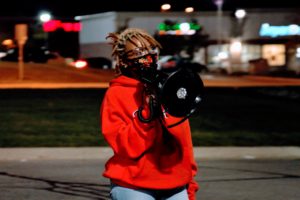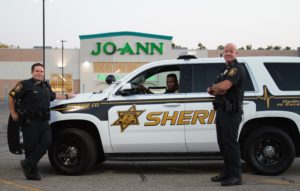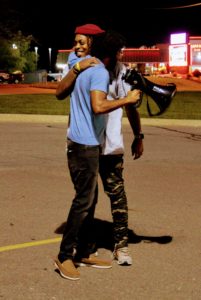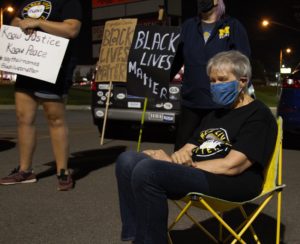By Tom Travis
In a statement issued Friday, Mayor Sheldon Neeley denounced the outcome of the Breonna Taylor case, in which a grand jury ruled to not indict any of the officers involved in the shooting death of Taylor, 26, in her home in Louisville, Kentucky March 13.
“It is such a deep and powerful pain we feel in part because it feels self-evident that the shooting death of Ms. Taylor was wrong. The conscience of America is at stake,” Neeley stated.
“Ms. Taylor’s death has weighed heavily on this nation. As a predominantly black community, it also weighs heavily on the hearts of many here in Flint,” he said.
Neeley condemned the role of Kentucky Attorney General Daniel Cameron in sending the case to a grand jury, and called for the U.S. Attorney General William Barr “to restore the faith of the American people in our criminal justice system by fully investigating and prosecuting the failures of those involved in the death of Breonna Taylor as well as the systematic failures that allowed this tragic shooting to occur.”
In an NPR report from Sept. 25 Tamika Palmer, the mother of Breonna Taylor, said “the justice system failed.” Palmer added, “I was reassured Wednesday of why I have no faith in the legal system, in the police, in the law,” Palmer said through her sister. “They are not made to protect us Black and brown people.”
Discussions have occurred locally throughout the summer between Black Lives Matter organizers and area police agencies about police reform as the racial tensions have escalated due to George Floyd’s death by a Pittsburgh police officer.
Mayor Neeley spoke to this issue in his statement, “In the City of Flint, we will begin immediately reviewing our policies on no-knock warrants and continue our work to proactively institute protections for all our residents.”
He concluded, “I have mourned the loss of Ms. Taylor. I have mourned over far too many other innocent black lives lost. While we are as an American people beginning to realize the effect of implicit bias, we must also combat the explicit bias all around us.
As I pray over these issues, I am reminded of “We are Called,” a popular spiritual hymn:
We are called to act with justice
We are called to love tenderly
We are called to serve one another
To walk humbly with God
Flint protests continue in response to the Breonna Taylor ruling
Black Lives Matter Flint protestors took to the streets of Flint Wednesday and Thursday evenings in response to the ruling of the Kentucky ruling. Flint Black Lives Matter organizers DeWaun Robinson and Johnnie Franklin led a group of about 50 protestors from downtown Flint’s flat lot on Saginaw Street towards City Hall.
Flint Police Chief Terence Green was present, along with a strong complement of Flint Police officers. Green explained to the Black Lives Matter protestors that the some of the street lanes were blocked by police vehicles for the protection of the protestors.
Video on social media from local residents and local TV news showed a truck driving through the crowd of protestors on Saginaw Street.
Protests erupted across the country in response to the Kentucky Attorney General’s ruling. One protestor in downtown Flint held a sign, a drawing of Breonna Taylor and the message, “Justice too long delayed is justice denied.”
Friday Black Lives Matter Flint protestors gather at Target
Friday night the protests continued in Flint Township in the Target parking lot on Miller Road. A row of ten Flint Township Police and Genesee County Sheriff vehicles lined up in precision around 6:30 p.m. in front of JoAnn Fabrics. Unmarked police vehicles were in the parking lot as well. The group of fewer than 25 was mostly white.
Around 7:30 p.m. Jovan Brown spoke to the group. Through a megaphone, Brown expressed her fears of being taken into custody because someone sees her as a “threat.”
“This is reality for being Black and being revolutionary,” she said.

Local artist and activist Jovan Brown (she goes by Jo or JoJo) speaks to the small crowd of protestors. (Photo by Tom Travis)
Brown said that while she doesn’t have any children of her own, she is concerned for her two younger sisters. Brown became overcome with emotion at one point while speaking. Unable to speak, Brown embraced Robinson and the crowd spoke encouragingly to her.

Genesee County Sheriff officers wait for the protest to begin in the Target parking lot on Miller Road. (Photo by Tom Travis)
Speaking to EVM afterwards, Brown said, “I don’t know why the color of my skin and color of my brother’s skin has caused some officers to feel that we are a danger to the community. That’s awful. So I have to come out here and do this. Honestly I feel compelled to be out here. This is bigger than myself. The showing of solidarity is extremely important to me. To actually see human bodies together that we can commune and work together and put our collective energy into something because we believe in it.”
After Brown, Black Lives Matter Flint leader DeWaun Robinson spoke, focusing his thoughts on what he called “the second day” work. Robinson explained the “second day” work is beyond the protests it is the process of how changes are going to be implemented in police training, policing policy and local, state and federal legislative policy changes.
Referring to local leadership, DeWaun said, “We got some flawed leadership right here in Flint, the city I love. But right now we’re doing the best we can to do some corrective action to change how the system is set up. That means we have to be part of the process.”

Black Lives Matter Flint leaders DeWaun Robinson (blue shirt) and Johnnie Franklin embrace as they begin their speeches in the Target parking lot on Miller Road. (Photo by Tom Travis)
Robinson mentioned The Police Oversight Commission saying that it is a vital part of the process because that commission requires the County Prosecutor to consider community consequences before charges are brought.
Taking questions from the press Johnnie Franklin said that he believes relations with the local police agencies has improved over the summer. But Franklin was clear saying that nationally it’s still a problem. He referenced other cities around the country that have had tumultuous responses and protests including Louisville, Chicago and even Detroit.
Robinson called out Flint Township resident Lorraine and her husband Dave Pettit and thanked them for being present and also for appearing at other civic events. Lorraine gave two thumbs-up to Robinson as the crowd applauded them.

Flint Township resident Lorraine Pettit sat during most of the speeches last night in the Target parking lot joining the protestors and wearing a Black Lives Matter Flint t-shirt. (Photo by Tom Travis)
EVM asked the Pettits what citizens could do to help with the racial tensions and inequality in our country, Dave Pettit said, “One thing I can suggest is for people to look at themselves.”
Pettit said this summer both of them read the book Me and White Supremacy by Layla Saad. Lorraine Pettit said the book changed her perspective and helped her realize how she was a white supremacist. Dave Pettit added, “It’s a really in-depth book looking into why we believe what we believe, why we were taught this way. It helps you see the roots of your training.”
EVM assistant editor Tom Travis can be reached at tomntravis@gmail.com.


You must be logged in to post a comment.